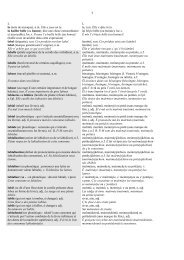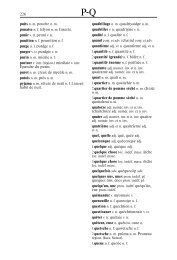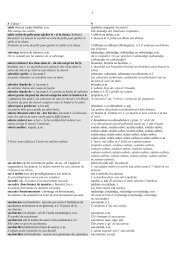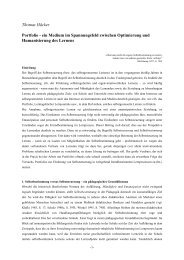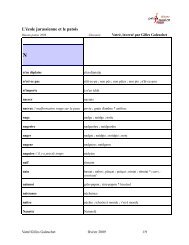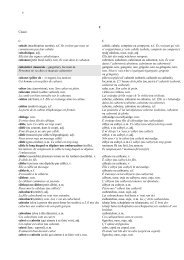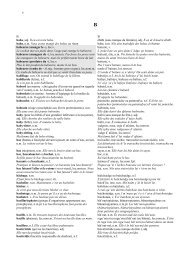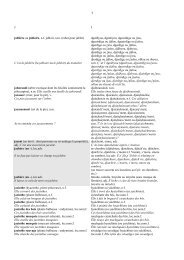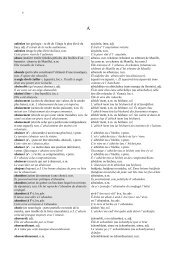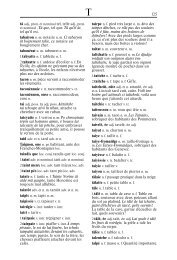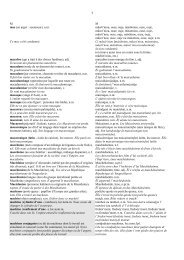R Classé ! R ra (onomatopée : coup de baguette ... - Image du Jura
R Classé ! R ra (onomatopée : coup de baguette ... - Image du Jura
R Classé ! R ra (onomatopée : coup de baguette ... - Image du Jura
You also want an ePaper? Increase the reach of your titles
YUMPU automatically turns print PDFs into web optimized ePapers that Google loves.
aidir ou roidir (se - ; <strong>de</strong>venir <strong>ra</strong>i<strong>de</strong> ou ten<strong>du</strong>), v.pron.<br />
«Il se dressa, se <strong>ra</strong>idit (ou roidit), bandant tous ses<br />
muscles» (Georges Duhamel)<br />
<strong>ra</strong>idir ou roidir (se - ; au sens figuré : tendre ses<br />
forces pour résister), v.pron. «Il s’était <strong>ra</strong>idi (ou roidi)<br />
contre l’adversité» (Victor Hugo)<br />
<strong>ra</strong>idissement ou roidissement (<strong>du</strong>rcissement), n.m. Il<br />
a comme un <strong>ra</strong>idissement (ou roidissement) d’un b<strong>ra</strong>s.<br />
<strong>ra</strong>idissement ou roidissement (au sens figuré : état <strong>de</strong><br />
ce qui est <strong>ra</strong>idi), n.m. « La mémoire et l’habitu<strong>de</strong>…<br />
intro<strong>du</strong>isent le vieillissement, le <strong>ra</strong>idissement (ou<br />
roidissement)» (Charles Péguy)<br />
<strong>ra</strong>idisseur (appareil qui sert à <strong>ra</strong>idir un fil, un câble ;<br />
ten<strong>de</strong>ur, cric-tenseur), n.m. Il place un <strong>ra</strong>idisseur à<br />
chaque bout <strong>du</strong> fil.<br />
<strong>ra</strong>idisseur (pièce <strong>de</strong>stinée à diminuer la flexion d’une<br />
plaque mince), n.m. Des <strong>ra</strong>idisseurs maintiennent la<br />
forme <strong>de</strong> l’aile <strong>de</strong> l’avion.<br />
<strong>ra</strong>ie (ligne droite, ban<strong>de</strong> mince et longue t<strong>ra</strong>cée sur<br />
quelque chose), n.f. « Le joint <strong>de</strong>s briques était mar-<br />
qué par <strong>de</strong> fines <strong>ra</strong>ies blanches » (Théophile Gautier)<br />
<strong>ra</strong>ie (ligne <strong>de</strong> sépa<strong>ra</strong>tion entre les cheveux), n.f.<br />
« Une <strong>ra</strong>ie soignée ouv<strong>ra</strong>it sa chevelure en <strong>de</strong>ux<br />
parties égales » (Guy <strong>de</strong> Maupassant)<br />
<strong>ra</strong>ie (poisson cartilagineux à corps aplati et nageoires<br />
pecto<strong>ra</strong>les triangulaires très développées), n.f. Nous<br />
avons mangé <strong>de</strong> la <strong>ra</strong>ie au beurre noir.<br />
<strong>ra</strong>ie d’absorption (en physique : ligne obscure<br />
interrompant un spectre continu), loc.nom.f. Il ignore<br />
pourquoi ce spectre comprend une <strong>ra</strong>ie d’absorbtion.<br />
<strong>ra</strong>ie d’émission (en physique : ligne brillante formant<br />
avec d’autres un spectre d’émission), loc.nom.f. Il<br />
relève la position <strong>de</strong> quelques <strong>ra</strong>ies d’émission.<br />
<strong>ra</strong>ie (petite -), loc.nom.f. Avec son jeu, il a fait une<br />
petite <strong>ra</strong>ie tout au t<strong>ra</strong>vers <strong>de</strong> la table.<br />
<strong>ra</strong>ies <strong>de</strong> couleur (une <strong>de</strong>s -, pa<strong>ra</strong>llèles d’un tissu;<br />
liteau), loc.nom.f. Une <strong>de</strong>s <strong>ra</strong>ies <strong>de</strong> couleur, pa<strong>ra</strong>llèles<br />
<strong>de</strong> l’essuie-mains est rouge.<br />
<strong>ra</strong>ies (marquer <strong>de</strong> -; <strong>ra</strong>yer), loc.v.<br />
Il a marqué un verre <strong>de</strong> <strong>ra</strong>ies.<br />
<strong>ra</strong>il-route (mo<strong>de</strong> <strong>de</strong> t<strong>ra</strong>nsport <strong>de</strong> marchandises<br />
utilisant à la fois le <strong>ra</strong>il et la route), n.m. On développe<br />
trop peu le t<strong>ra</strong>nsport <strong>ra</strong>il-route.<br />
<strong>ra</strong>iner (creuser, entailler en faisant une <strong>ra</strong>inure, <strong>de</strong>s<br />
<strong>ra</strong>inures), v. Le bouvet est un outil à <strong>ra</strong>iner.<br />
<strong>ra</strong>inures (<strong>ra</strong>bot pour faire <strong>de</strong>s -; bouvet), loc.nom.m.<br />
Le menuisier passe le bouvet pour faire une <strong>ra</strong>inure.<br />
<strong>ra</strong>inures (<strong>ra</strong>bot pour faire <strong>de</strong>s -; guillaume),<br />
loc.nom.m. Le menuisier utilise un <strong>ra</strong>bot pour faire<br />
une <strong>ra</strong>inure.<br />
<strong>ra</strong>iponce (plante potagère dont on mange les <strong>ra</strong>cines<br />
s’ roidi, v.pron.<br />
«È s’ d<strong>ra</strong>ssé, s’ roidéché, baindaint tos ses muchques »<br />
s’ roidi, v.pron.<br />
«È s’ était roidi contre l’ aivèrchitè »<br />
roidéch’ment, n.m. Èl é c’ment qu’ ïn roidéch’ment d’ ïn b<strong>ra</strong>is.<br />
roidéch’ment, n.m.<br />
« Lai mémoûere pe l’ aivége …ïndgeant l’ véyéch’ment,<br />
le roidéch’ment »<br />
roidéchou, n.m.<br />
È piaice ïn roidéchou en tchétçhe bout di flè.<br />
roidéchou, n.m.<br />
Des roidéchous maint’nant lai f<strong>ra</strong>me <strong>de</strong> l’ âle d’ l’ oûejé d’ fie.<br />
râye, <strong>ra</strong>ye, roûe ou roue, n.f.<br />
« Le djoint <strong>de</strong>s britçhes était mairtçhè poi d’ fïnnes biantches<br />
râyes (<strong>ra</strong>yes, roûes ou roues) »<br />
râye, <strong>ra</strong>ye, roûe ou roue, n.f.<br />
« Ènne changnie râye (<strong>ra</strong>ye, roûe ou roue) eûv<strong>ra</strong>it sai tchveyure<br />
en doûs l’ égâs paitchies»<br />
çhaivela<strong>de</strong>, n.f.<br />
Nôs ains maindgie d’ lai çhaivela<strong>de</strong> â noi burre.<br />
râye (<strong>ra</strong>ye, roûe ou roue) d’ aibchorbchion, loc.nom.f.<br />
È noére poquoi ç’t’ échpèctre ïnçhôt ènne râye (<strong>ra</strong>ye, roûe ou<br />
roue) d’ aibchorbchion.<br />
râye (<strong>ra</strong>ye, roûe ou roue) d’ émichion, loc.nom.f.<br />
È r’yeve lai pôjichion <strong>de</strong> quéques râyes (<strong>ra</strong>yes, roûes ou roues)<br />
d’ émichion.<br />
râyatte, <strong>ra</strong>yatte, n.f. D’aivô son djûe, èl é fait ènne râyatte<br />
(ou <strong>ra</strong>yatte) tot â t<strong>ra</strong>ivie d’ lai tâle.<br />
lïnteau, liteau, yïnteau, yinteau (Sylvian Gnaegi) ou yiteau, n.m.<br />
Yun <strong>de</strong>s lïnteaus (liteaus, yïnteaus, yinteaus ou yiteaus)<br />
d’ l’ échue-mains ât roudge.<br />
<strong>ra</strong>îyie, <strong>ra</strong>iyie, râyie, <strong>ra</strong>yie, roûelaie ou rouelaie, v.<br />
Èl é <strong>ra</strong>îyie (<strong>ra</strong>iyie, râyie, <strong>ra</strong>yie, roûelè ou rouelè) ïn voirre.<br />
râye-vie, <strong>ra</strong>ye-vie, roûe-vie ou roue-vie, n.m.<br />
An n’ dév’yoppe pe prou lai t<strong>ra</strong>inchpoétche râye-vie (<strong>ra</strong>ye-vie,<br />
roûe-vie ou roue-vie).<br />
rouaînnaie ou rouainnaie, v.<br />
L’ bovait ât ïn uti è rouaînnaie (ou rouainnaie).<br />
bovaitchon, bovie ou bovion, n.m. Le m’nujie pésse le<br />
bovaitchon (bovie ou bovion) po faire ènne <strong>ra</strong>innure.<br />
dyâme ou dyame, n.m.<br />
Le m’nujie s’ sie d’ ïn dyâme (ou dyame) po faire ènne djairdjâle.<br />
et les feuilles), loc.nom.m. Elle arrose les <strong>ra</strong>iponces.<br />
<strong>ra</strong>ichponche, n.f.<br />
Èlle ennâve les <strong>ra</strong>ichponches.<br />
<strong>ra</strong>ire ou réer (crier pour un cerf ou pour un<br />
brâimaie, b<strong>ra</strong>imaie, brâmaie, b<strong>ra</strong>maie, breuillie (J. Vienat),<br />
chevreuil), v. On entend les cerfs qui <strong>ra</strong>ient (ou réent) breûyie, breuyie, <strong>ra</strong>îlaie ou <strong>ra</strong>ilaie, v. An ôt les cies qu’ brâimant<br />
dans la forêt.<br />
(b<strong>ra</strong>imant, brâmant, b<strong>ra</strong>mant, breuillant, breûyant, breuyant,<br />
<strong>ra</strong>îlant ou <strong>ra</strong>ilant) dains l’ bôs.<br />
<strong>ra</strong>is (<strong>ra</strong>yon <strong>de</strong> lumière, etc.), n.m. « Un <strong>ra</strong>is <strong>de</strong> soleil râ, <strong>ra</strong>, <strong>ra</strong>î, <strong>ra</strong>i, ré, rés, roi, roûe ou roue, n.m. « Ïn râ (<strong>ra</strong>, <strong>ra</strong>î, <strong>ra</strong>i,<br />
fuse <strong>de</strong>s volets mi-clos » (F<strong>ra</strong>nçois Mauriac) ré, rés, roi, roûe ou roue) <strong>de</strong> s’<strong>ra</strong>ye feûje <strong>de</strong>s mé-çhôses lâ<strong>de</strong>s »<br />
<strong>ra</strong>is (<strong>ra</strong>yon <strong>de</strong> roue), n.m. Un <strong>ra</strong>is <strong>de</strong> roue est tor<strong>du</strong>. râ, <strong>ra</strong>, <strong>ra</strong>î, <strong>ra</strong>i, ré, rés, roi, roûe ou roue, n.m. Ïn râ (<strong>ra</strong>, <strong>ra</strong>î, <strong>ra</strong>i,<br />
ré, rés, roi, roûe ou roue) d’ lai rûe â toûeju.<br />
13



